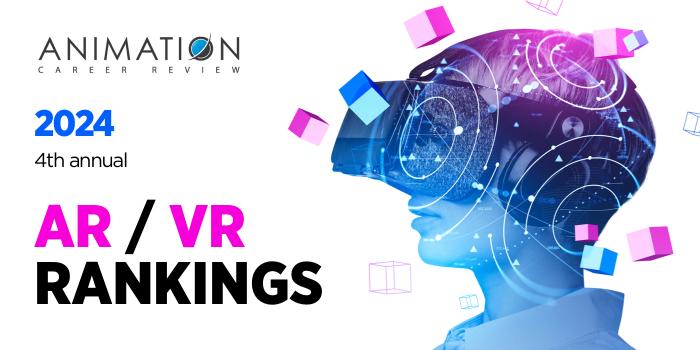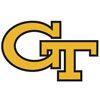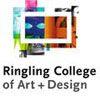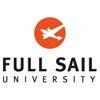
Did you know? Savannah College of Art and Design offers AR/VR resources, a green screen, a motion media lab, more than 800 computers networked to reduce render times, and immersive reality classrooms. Learn more.

| Ranking | School | State |
|---|---|---|
| 1 | Georgia Institute of Technology | Georgia |
| 2 | Savannah College of Art and Design | Georgia |
| 3 | University of Central Florida | Florida |
| 4 | University of North Carolina at Chapel Hill | North Carolina |
| 5 | Duke University | North Carolina |
| 6 | University of Florida | Florida |
| 7 | Ringling College of Art and Design | Florida |
| 8 | North Carolina State University | North Carolina |
| 9 | Full Sail University | Florida |
| 10 | University of South Carolina-Aiken | South Carolina |
Our 2024 rankings -our fourth annual- of the Top 10 AR/VR School Programs in the South. For an explanation of ranking criteria, click here.

Georgia Institute of Technology (Georgia Tech) provides several paths to study AR/VR in the College of Computing. One of the largest computing colleges in the nation, the Georgia Tech College of Computing houses the Schools of Computer Science, Computational Science and Engineering, and Interactive Computing.
Specific AR/VR-related degree options across schools include the BS in Computational Media (BSCM), and BS, MS and PhD degrees in Computer Science. Ideal minors include Computing and Devices; Scientific Engineering and Computing; Computing and Intelligence; Computing and People; Computing and Media; and Computing and Systems Architecture.
With approximately 300 students, the Computational Media BS is joint offering between the College of Computing and the School of Literature, Media, and Communication (within the Ivan Allen College of Liberal Arts), and the School of Music within the College of Design. One of Georgia Tech’s fastest growing programs, the BSCM is the top choice for students interested in AR/VR.
The program provides the opportunity to select a thread, allowing students to create their own computing degree. Thread examples include Modeling and Simulation; Devices; Systems and Architecture; Media; and Information Networks. All students have access to courses such as People and Interaction Design; Intelligence and Games; Constructing the Moving Image; Experimental Media; Intelligence and Interaction Design; Science, Technology and Performance; Computer Animation; and Media and Interaction Design.
Students in all Georgia Tech programs have the opportunity to work and learn in the GVU Center. Examples of the centers core research areas include AR/VR, wearable computing, gaming, human-computer interaction, artificial intelligence, social computing, graphics and animation, robotics, information visualization, mobile and ubiquitous computing, and educational technologies.
Within the Georgia Tech GVU Center is the Augmented Environments Lab, which focuses on building interactive computing environments that directly augment the user senses with computer-generated material. The center also houses the Prototyping eNarrative Lab (PeN Lab), which focuses on emerging platforms such as AR/VR; simulation and game design; storytelling as it relates to digital experiences; and experimental television.
Across GVU Center labs, past and current projects include Bringing Interactivity to Static Data Visualization through AR; Interactive Techniques for Children’s AR Education; Argon: AR-Enabled Web Browser; Augmented Reality and the Fan Experience of Esports; ARToss: Networked Argon3 Game Demo; Auburn Avenue: Augmented Reality for Cultural Heritage; Exploring AR Potential in Extending Visiting Experience of Aquariums and Zoos; and Smart Home with AR Interface Control.
Upon completion of any AR/VR-related program at Georgia Tech, students will complete a capstone project. Graduates are prepared to pursue careers in areas such as AR/VR, robotics, animation, game development, special effects, human-computer interaction, and simulation.
Georgia Tech alumni have been hired by companies such as Boeing, Cisco Systems, Intel, Microsoft, Apple, IBM, Google, Disney, Tesla, and Delta Airlines.
Georgia Institute of Technology was established in 1885. When it opened, the school had just 129 students enrolled in one degree program—the Mechanical Engineering BS. Today, Georgia Tech serves nearly 50,000 students in-person at the main campus in Atlanta, at Georgia Tech-Europe in France, at Georgia Tech-Shenzhen in China, and through distance and online learning. Students have access to 180 degree programs and minors across six distinct colleges and 28 schools. Georgia Institute of Technology is accredited by the Southern Association of Colleges and Schools Commission on Colleges (SACSCOC).

Savannah College of Art and Design (SCAD) houses the country’s first degree dedicated to immersive reality. Housed in the School of Digital Media, this STEM-designated program allows students to take courses in related fields such as interactive design, user experience (UX) design, and visual effects. Students may add an additional major or minor in any of these areas.
Leading to a BFA in Immersive Media, the program provides access to Montgomery Hall, which houses AR/VR resources, more than 800 computers networked to decrease render times, a green screen, and a motion media lab. And in The Shed at SCAD, immersive reality labs and classrooms provide the latest technology for creating innovative visual experiences.
Other program features include collaborative projects with students and faculty across disciplines; access to panels and presentations by gaming giants such as Ubisoft, EA Sports, and Cartoon Network Games; and study abroad opportunities at SCAD Lacoste in France and other countries.
Students will begin the Immersive Reality BFA program with Foundation Studies courses such as Design I: Elements and Organization, Design II: 3D Form and Space, Design III: Time, Creative Thinking Strategies, and Storyboarding Essentials. Mathematics or Computer Science, Digital Communication, and Speaking of Ideas are just a few required General Education courses.
Provided at the Savannah campus only, the Immersive Reality BFA begins with 30 credit hours of foundation studies courses. Creative Thinking Strategies; Storyboarding Essentials; Design I: Elements and Organizations; Design II: 3D Form in Space; and Color: Theory and Application are a few course examples.
Upon completion of foundations courses, students will then move on to general education courses, totaling 55 credit hours. Course examples include Digital Communication; Speaking of Ideas; Foundations of Story; Mathematics of Computer Science; and Visual Culture in Context: Making Modernities.
The Immersive Media major consists of 80 credit hours. Students may also take 15 credit hours of electives from any area. Major course examples include Immersive Revolution: Augmented to Virtual Reality; Visual Effects for Immersive Environments; Virtual Reality for Motion Media; Visual Storytelling: Virtual Reality to Interactive; Integration of Immersive Realities; Applied Principles: Physical Computing; Advanced Programming for Visual Effects; Immersive Sound Design; and Advanced Application Scripting.
In the final years of the Immersive Media BFA program at SCAD, students will complete 400-level courses such as Studio I: Storytelling and Spatial Interaction; Studio II: Production and Project Management; Immersive Studio Postproduction; and Immersive Reality Professional Portfolio. Students may also complete an internship for one quarter, on-site with a company, studio, or organization.
All Immersive Media students have access to the expanded Savannah Film Studios, which is the largest and most comprehensive university film studio complex in the nation. This 10.9-acre facility includes a next-generation XR stage for virtual productions, new soundstages, and a new 11-acre Hollywood backlot.
Launched in 2014, the original Savannah Film Studios building consisted of a 22,000-square-foot facility with three soundstages, green rooms, lighting grids, postproduction suites, a multi-purpose recording booth for ADR and Foley recordings, screening rooms, and production offices for SCAD’s film and television program.
Graduates of the Immersive Reality BFA program at Savannah College of Art and Design are prepared to pursue a graduate degree or titles such as AR/VR Developer, VR Content Producer, AR Designer, Mixed Reality Artist, Virtual Production Technical Director, Creative/UX Designer, Technical Artist, Game Designer, Environmental Artist, or Realtime Artist.
Nearly 100% of SCAD graduates are employed, enrolled in a graduate program, or both within 10 months of graduation. Immersive Reality alumni have been hired by companies and studios such as Autodesk, Microsoft, Epic Games, Adobe, Google, Blizzard Entertainment, ZeniMax Online Studios, and Facebook, and Magic Leap.
Savannah College of Art and Design provides more degree programs and specializations than any other art and design college in the U.S. In 1979, the school opened in the renovated Savannah Volunteer Guards Armory with just one classroom, an administration building, and 71 students. Today, SCAD serves more than 17,500 students from all 50 states and more than 120 countries.
SCAD has campuses in Atlanta and Savannah, Georgia; Lacoste, France; and SCADNow (online). Programs include more than 100 degrees and 75+ minors and certificates. Savannah College of Art and Design is accredited by the Southern Association of Colleges and Schools Commission on Colleges (SACSCOC), the Council for Interior Design Accreditation (CIDA), and the National Architecture Accrediting Board (NAAB).

University of Central Florida (UCF) provides several paths to study AR/VR in the College of Engineering and Computer Science, Department of Computer Science; the School of Modeling, Simulation, and Training (SMST); and UCF Continuing Education. In addition to degree programs and certificate options, students interested in studying AR/VR have access to several labs that focus on collaboration, AR/VR systems and applications creation, and AR/VR research.
Housed in Institute for Simulation & Training (IST), the Synthetic Reality Lab is part of several larger UCF entities. Known as SREAL (pronounced Surreal), the lab is a center for affiliated faculty members, software developers, PhD students, modelers and animators, researchers, and interactors such as digital puppeteers. With 7,000 square feet of office and experimental space, SREAL has spaces dedicated to the development of AR/VR; human surrogate and robotics research; mixed reality experiences; developing cultural heritage and STEM experiences; and interactive training using digital avatar technology.
The Interactive Systems and User Experience Lab focuses on the development of innovative techniques, tools, and applications that enhance the overall experience between humans and machines.
Program options in the Department of Computer Science include the Computer Science (CS) BS; an Accelerated BS/MS in CS; and a Mixed Reality Engineering graduate certificate. The School of Modeling, Simulation, and Training houses the MS and PhD degrees in Modeling and Simulation. Both programs are also part of the College of Graduate Studies.
In partnership with Circuit Stream, UCF Continuing Education provides an XR Development with Unity course that can prepare students to become an AR/VR developer in 10 weeks. Areas covered include AR application development, C# script coding, VR application development, and XR development and game creation with Unity. Upon completion of the fully online course, students will receive a VX Developer digital badge from UCF Continuing Education and Circuit Stream.
The Computer Science BS at UCF consists of courses such as Algorithms for Machine Learning, Robot Vision, Game Programming, Software Engineering, Computer Graphics, Advanced AI, Computer Architecture, and AI for Game Programming. Graduates are prepared for careers in fields such as AR/VR, Computer Architecture, Computer Gaming, Computer Vision, Evolutionary Computing, Media Convergence, Robotics, and many others.
The Computer Science MS at UCF allows students to specialize in a research area. This includes options such as VR, Mixed and Virtual Reality Mobile Computing, Modeling and Simulation, Machine Learning, Human-Computer Interaction (HCI), and Artificial Intelligence (AI). Pairing (combining two research areas) is also an option. In addition to their chosen specialization, CS MS students will study programming systems and languages, computer science theory, and computer architecture.
The Mixed Reality Engineering graduate certificate requires nine credit hours of coursework beyond the bachelor’s degree. Courses include Virtual Reality Engineering; Augmented Reality Engineering; and the culminating Mixed Reality Project, which includes the development of a mixed reality system or software application.
The MS and PhD programs in Modeling and Simulation provide opportunities to specialize in areas such as Visualization and Immersive Environments (VR/MR/XR); Training, Modeling, and Simulation; Human-Computer Interaction; Interactive Simulation, and Cognition; Operational Modeling, Simulation, and Optimization; and Predictive Analytics and Machine Learning. The UCF Modeling and Simulation MS program can be completed online.
Graduates of the Computer Science and Modeling and Simulation programs at University of Central Florida are prepared to pursue careers in areas such as AR/VR, software engineering, defense, entertainment, software development, game design and development, computer science, information security, aerospace, computer systems, and cybersecurity.
UCF technology alumni are routinely hired by major companies and organizations such as NASA, Cisco, Lockheed Martin, Siemens, IBM, Apple, Oracle, Google, Intel, Accenture, Amazon, and YouTube.
University of Central Florida was founded in 1963. The school opened its doors in 1968 as Florida Technological University (FTU). On the first day of classes, FTU had less than 2,000 students. Today, UCF is a public research university that serves 69,320 students, making it the largest university by enrollment in the state of Florida. The school is also one of top five largest universities in the nation. UCF students have access to 240 degree programs across 13 colleges. University of Central Florida is accredited by the Southern Association of Colleges and Schools Commission on Colleges (SACSCOC).

University of North Carolina at Chapel Hill (UNC-Chapel Hill) houses a number of labs, groups, and clubs that support the study, research, and development of AR/VR. The school also provides degree options that can help students break into the AR/VR industry.
Students interested in AR/VR at UNC-Chapel Hill have access to the Graphics, Imaging, and Robotics Lab; the Graphics and 3D Vision Laboratory; the UNC Augmented and Virtual Reality Interest Group (UNC AR/VR); and the Carolina Augmented and Virtual Reality Club (CARVR).
The Graphics, Imaging, and Robotics Lab is a 3,500 sq. ft. space located in J. Carlyle Sitterson Hall. Most of the lab is dedicated to work in effective virtual environments. The remaining area, which houses a variety of robots, focuses on robotics research.
Housed in the Frederick P. Brooks Jr. Computer Science Building and Sitterson Hall, the Graphics and 3D Vision Laboratory is situated in a noise-controlled, 2,500 sq. ft. space divided into three research zones by floor-to-ceiling blackout curtains for light and sound suppression. Zones include Projective Display Research, Computer Vision and Optical Tracking Research, and Physical Simulation and Audio Synthesis Research with a focus on GPU processing. The space has 11-foot ceilings and a Unistrut mounting grid.
The Carolina Augmented and Virtual Reality Club (CARVR) provides the opportunity to work on extended reality (XR) projects with real clients. The UNC Augmented and Virtual Reality Interest Group (UNC AR/VR) is a collection of more than 250 faculty and students from across campus. The Group focuses on learning, training, research, and entrepreneurship through the use of immersive technologies.
Across all options, students have access to workshops, panels, research showcases, and more. Projects have included ARt Walk on Franklin; Geometric Algorithms for Modeling, Motion, and Animation Group (GAMMA) Project; the Walkthrough Group, (simulated walkthroughs of architectural models); and the Effective Virtual Environments Project.
The College of Arts and Sciences at University of North Carolina at Chapel Hill houses the Department of Computer Science (CS). Established in 1964, the CS Department was one of the first independent computer science departments in the U.S. Within the department are BS, MS, and PhD degrees in Computer Science.
Students have the option to select the Computer Graphics or Human-Computer Interaction (HCI) Research Area. Computer Graphics sub-areas include Virtual Environments; Animation and Simulation; and Visualization. HCI sub-areas include Virtual Environments.
Course examples across programs include Digital Logic and Computer Design; Human Robot Interaction; Machine Learning; Software Engineering Laboratory; 2D Computer Graphics; Models of Languages and Computation; Digital Culture; Connecting Language to Vision and Robotics; and Scientific Programming.
Graduates of the Computer Science programs at UNC-Chapel Hill are prepared to pursue advanced roles in areas such as AR/VR, game design and development, software development, AI, HCI, mobile app development, entertainment, computer hardware engineering, architecture, marketing, and healthcare.
UNC-Chapel Hill alumni have gone on to establish careers at places such as Microsoft, Cisco, Google, Amazon, Lenovo, America Airlines, SAS – Analytics Software & Solutions, Red Hat Software (a subsidiary of IBM), Capital One, and Accenture.
University of North Carolina at Chapel Hill was established in 1789. The school welcomed its first students in 1795, becoming the first and only public university in the U.S. to award degrees in the 18th century. Today, UNC-Chapel Hill serves approximately 32,235 students enrolled in more than 250 degree programs across 14 colleges and schools. University of North Carolina at Chapel Hill is accredited by the Southern Association of Colleges and Schools Commission on Colleges (SACSCOC).

Trinity College of Arts and Sciences at Duke University (Duke) is home to the Department of Computational Media, Arts and Cultures, and the Department of Computer Science. Duke also houses Pratt School of Engineering. Collectively, the departments and school provide numerous paths to study AR/VR. This includes a collaborative studio, innovative labs, and degree programs at all levels.
Studios include the Multimedia Project Studio (MPS) at Duke, which provides resources for students and developers to begin their VR projects. Labs include the Institute for Virtual and Augmented Reality for the Digital Humanities (VARDHI); Duke Immersive Virtual Environment (DiVE); the Innovation Co-Lab; TEC VR at the Technology Engagement Center/Co-Lab; Bolt VR; and the Dig@Lab.
The Institute for Virtual and Augmented Reality for the Digital Humanities (VARDHI) focuses on the application of VR and AR to humanities research, outreach, and teaching. Duke Immersive Virtual Environment (DiVE) is a large-scale virtual reality facility established in 2005.
The Innovation Co-Lab explores VR technology. TEC VR at the Technology Engagement Center/Co-Lab is a space where students can experience VR. The Bolt VR space is equipped with a state-of-the-art, custom gaming PC, 4K display for remote, and the Vive immersive VR system. The Dig@Lab focuses on conducting AR/VR research, and the development of apps, virtual environments, and VR applications.
Duke University’s most popular undergraduate program for AR/VR students is Computer Science. Leading to a BA, BS, MS, or PhD, the program provides access to all of the school's labs and studios. BS students may concentrate in AI and Machine Learning, Software Systems, or Data Science. MS students may concentrate in AI and Machine Learning. PhD students may focus in just about any area from AI and cloud computing to computer vision and scientific computing.
Duke students may also enroll in an Interdepartmental Major (IDM), which combines two academic disciplines in Trinity College with seven courses from each discipline.
Graduates of the Computer Science and IDM programs at Duke University are prepared to pursue careers in all industries that utilize AR/VR as well as fields such as computer science, aerospace, game design and development, entertainment, education, law enforcement training, architecture, and defense.
Although Duke University was officially established in 1924, the university’s School of Law and Trinity College of Arts and Sciences were established in 1904 and 1859, respectively. Duke’s other eight colleges and schools were established between 1926 and 2009. Today, Duke University serves 16,840 students enrolled in more than 225 majors, minors, certificates, and graduate programs. Duke University is accredited by the Commission on Colleges of the Southern Association of Colleges and Schools.

University of Florida (UF) is home to the College of the Art. Established in 1925, the college houses seven divisions that provide dozens of degree programs, minors, and certificate programs fully accredited by the National Association of Schools of Art and Design (NASAD), the National Association of Schools of Music (NASM), the National Association of Schools of Theatre (NAST), and the National Association of Schools of Dance (NASD).
One of the seven divisions in the College of the Arts is the Digital Worlds Institute. This interdisciplinary center for digital arts and technology houses a graduate level program that’s ideal for students seeking careers in AR/VR. The Master’s in Digital Arts and Sciences (MiDAS) is a one-year, accelerated program that explores emerging technologies, specifically AR/VR, as well as interactive media and innovation. Individuals from all backgrounds are encouraged to apply.
The MiDAS program curriculum is divided into three areas including Technical Skills; Design and Interactivity; and Professional Skills. The Technical Skills area focuses on game engines and development (i.e. Unity 3D), and software and hardware integration.
The Design and Interactivity area focuses on visual design tools/tech, 3D for AR/VR, UI-UX, audio, digital compositing, and digital storytelling. In the Professional Skills area students will learn to create project proposals, navigate production pipelines, conduct project management activities, and develop critical thinking and analysis skills.
Other MiDAS program features include learning that takes place in high-tech classrooms; opportunities to work on real-world projects in the industry; personal attention from faculty and content area experts; a collaborative environment; and portfolio development.
UF MiDAS students also have access to the UF Reality Lab at the Digital Worlds Institute. This in-demand facility explores and promotes projects, research, and education in AR/VR. Students in the Lab have access to courses such as Production of Immersive Environments; Movement, Media, and Machines; Digital Storytelling; and Interdisciplinary Research Seminar.
Past UF Reality Lab student projects include Animate Using Your Hands in Virtual Reality; Metrolia VR Multiplayer Mech Duel; HoloTouch; Space Mail; WonderLab, and SpArc: ScootVR.
Graduates of the MiDAS and other related programs have been hired at places such as the U.S. Department of Defense, Boeing, ESPN, Walt Disney, GE Digital-Meridium, Cox Media Group, the U.S. Navy, Glaxo Smith Klein, Spirit Airlines, Aramark, Reed Exhibitions, and 22squared.
University of Florida was founded in 1858 as Gainesville Academy. When it opened, the Academy has just a few students. Today, UF serves approximately 60,4980 students making it one of the five largest universities in Florida, and one of the 20 largest universities in the U.S. More than 300 programs are available at UF, across 16 colleges and schools. University of Florida is accredited by the Southern Association of Colleges and Schools Commission on Colleges (SACSCOC).

Ringling College of Art and Design is home to the world’s first degree program dedicated solely to Virtual Reality Development. Established in 2018 and housed in the Virtual Reality Department, this focused BFA program helps students develop skills in designing, developing, and analyzing immersive experiences. The program also explores communication, collaboration, and professional practices.
For students seeking a shorter program or add-on to another major, Ringling has a Virtual Reality Development minor, consisting of 15 credit hours, and an Artificial Intelligence (AI) certificate, consisting of nine credits. Students in the minor will take History of Immersive Media; Introduction to Virtual Reality; and 3D Design. The remaining courses may be selected from eight options. All options focus on immersive media, AR/VR, virtual worlds, and/or extended reality (XR).
Consisting of 120 credit hours, the Virtual Reality Development BFA program features courses such as Introduction to Virtual Reality; Immersive Media Design I-IV; History of Immersive Media; Iterative Design; Programming for Immersive Media; Concept Development for Virtual Worlds; Visual Scripting; 3D Technical Art, Visual Development: UI/UX; and 2D Design. Open electives allow students to develop skills in other areas.
Electives may be selected within the Virtual Reality Development Department or other departments at Ringling. Possible electives include Computer Animation; 3D for Games; Story Development; Topics in XR (Extended Reality) Development; Programming for Artists; Realtime Visual Effects for Games; Python for Artists; and Special Topics: Wearable Messages.
In the final year of the Virtual Reality Development BFA program, students will complete VR Thesis Preproduction; VR Capstone Project IA; VR Capstone Project IB; and VR Capstone Project II. These courses culminate with a professional portfolio of the student's best work.
Graduates of the Virtual Reality Development BFA program at Ringling College of Art and Design are prepared to pursue careers in all industries that utilize AR/VR. Examples include defense, aerospace, engineering, architecture, aviation, the military, corporate training, game design and development, corporate training, healthcare, advertising, automotive, disaster management, architecture, eCommerce, retail, tourism and travel, sports, law enforcement training, wellness, interior design.
Program alumni have been hired at places such as Microsoft, Epic Games, Google VR, Insomniac Games, General Motors (GM), Disney VR, Meta Platforms, Inc., Framestore, Oculus VR, Flight School, ILMxLab, Rewind Studios, Hoyt Architects, Magic Leap, Kite & Lightning, D3 Creative Studios, Sharecare, BAOBAB Studios, Ready at Dawn, Halon Entertainment, Mote Marine Labs, and Immersive Health Group.
Ringling College of Art and Design was founded in 1931 by Dr. Ludd Spivey in collaboration with circus magnate John Ringling. The school began as The School of Fine and Applied Art of the John and Mable Ringling Art Museum—a branch of Southern College. Dr. Spivey was serving as President of SC at the time.
Today, Ringling College of Art and Design is Florida’s only institution of higher learning dedicated exclusively to art and design education. This private, not-for-profit college serves approximately 1,700 students enrolled in 13 degree programs. RCAD is accredited by the National Association of Schools of Art and Design (NASAD) and the Southern Association of Colleges and Schools Commission on Colleges (SACSCOC).

North Carolina State University (NC State) is home to several colleges that provide a number of paths to study AR/VR. These colleges also house several labs that support AR/VR education, experimentation, research, and development. These include the Experience Design (IX) Lab and Mixed Reality (MxR) Lab in the College of Design; the Virtual and Augmented Reality Lab (VARL) in the College of Engineering’s Edward P. Fitts Department of Industrial and Systems Engineering (ISE); and the Gaming and VR Studio at the D.H. Hill Jr. Library.
The College of Design’s IX Lab is a cross-disciplinary community of artists, designers, scientists, and engineers that focus on expanding worlds through AR/VR and other new and emerging technologies. The college’s MxR Lab consists of designers, engineers, and individuals interested in experimentation. This Lab focuses on AR/VR/MxR technologies. Past projects include Pop’n’Play, Axe One, and Morphaces.
The Edward P. Fitts Department of Industrial and Systems Engineering is one of just five ISE departments in the United States. In the department’s VARL, researchers study the interaction between humans and AR/VR. Projects are funded by the National Science Foundation and include Scale Cognition through Advanced Learning Environments in Virtual Reality (SCALE-VR); Virtual Instructor Application Using Augmented Reality for Worker Posture Training; and Investigation of Virtual Reality Guided Upper Limb Exercises.
VARL equipment includes four-sided (C4) Cave Automatic Virtual Environment (CAVE) with full-body tracking capability, several head-mounted displays (HMDs), and a head-up display (HUD). In addition, a variety of peripheral devices that support movement tracking are available.
The Gaming and VR Studio is a collaborative space designed for experimentation with virtual and mixed reality hardware; engaging in an extensive catalog of VR experiences; and developing interactive media experiences. The studio houses virtual reality, game development, and illustration and modeling workstations, as well as exhibits, a libraries channel for livestreaming, and drop-in consultation services.
Degree programs for students interested in AR/VR are housed in the College of Design’s Department of Media Arts, Design and Technology. Options include BA and MA degrees in Art and Design, and a 16 credit hour Art and Design minor with a customizable curriculum. All programs provide access to the schools IX, MxR, and VARL labs, and the Gaming and VR Studio.
The interdisciplinary, studio-based Art and Design BA program provides the opportunity to develop creative portfolios in a variety of areas. Examples include AR/VR, game design, interactive and computational media, graphic and interactive narratives, 3D modeling, visual effects (VFX), and motion graphics. Students interested in AR/VR may also select the concentration in Gaming + Interaction Design or create a focus area through required free electives totaling 12 credit hours.
Elective examples include Advanced Digital Techniques; Art and Design Laboratory; and Digital Representation. Course examples for the program include Visualization; Creative Technology Studio I-II; Digital Imaging; Animation; Digital Motion; Art and Design Laboratory I-II; Digital Representation; and Advanced Digital Techniques.
The Art and Design MA (M.A.D) focuses on experimental media arts. Depending on the student’s academic background and experience, they may enroll in the 30-, 48- or 72-credit track. Course examples include Graduate Studio: Immersive and Experimental Narratives; Coding for Designers; Sequential Imaging; Special Effects; Dynamic Data; Visualizing Narratives; Digital Motion; Animation; and Digital Modeling.
Final projects for the M.A.D. program may explore AR/VR, VFX, interactive and computational media, visual composition, graphic and interactive narratives, and motion graphics, among others.
Graduates of the Art and Design programs at North Carolina State University are prepared to pursue careers in areas such as AR/VR, software design, SFX and VFX, game design and development, and multimedia design. Some NC State Art and Design graduates go on to launch their own studios or freelance businesses
Graduates of NC State’s College of Design and College of Engineering are routinely hired by major companies and organizations such as Microsoft, Booz Allen Hamilton, Google, IBM, Amazon, Boeing, Apple, Cisco Systems, General Electric, Lenovo, Tesla, Dell, the US Army, Meta Platforms, Inc., Volvo, SAS Institute, John Deere Corporation, Intel, Caterpillar, AT&T, and Raytheon.
North Carolina State University is the largest university in the University of North Carolina System. Established in 1887 as a land-grant institution focusing in agriculture and engineering, NC State serves approximately 38,440 students enrolled in more than 300 degree programs across 11 colleges, 68 departments, and The Graduate School. North Carolina State University is accredited by the Southern Association of Colleges and Schools Commission on Colleges (SACSCOC).

Full Sail University (Full Sail) has been incorporating extended reality into its curriculums for over 25 years. The school is home to the Institute of Emerging Technologies, which houses software engineering spaces and tech labs such as the AR/VR Lab, FabLab, Simulation Lab, Smart Lab, and UX Lab. These labs and spaces provide just about every available piece of AR or VR hardware available today as well as state-of-the-art equipment such as green screens, power tools, and injection molders, and 3D printers.
Full Sail Institute of Emerging Technologies also has partnerships with companies such as NASA, Boeing, Epic Games, Torch Technologies, Advent Health University, and Echelon. And in 2021, the school joined the Orlando/Central Florida Chapter of the VR/AR Association (VRARA) to continue its mission to support the VR/AR community through education and research.
In addition to labs, production spaces, and partnerships, Full Sail University provides two formal paths to study AR/VR. Options include the Simulation and Visualization BS and the Computer Science BS (CS BS) with a concentration in Artificial Intelligence (AI). Simulation and Visualization students will take courses such as Virtual and Augmented Reality; Simulation Production; Machine Intelligence Systems; Programming I & II; Artificial Intelligence (AI); Computer Graphics; Simulation and Visualization Software; Software Engineering; Systems Programming; Data Structures and Algorithms; and Microcontrollers.
Students in the CS BS/AI program will take courses such Human-AI Interaction; Deep Learning; Machine Intelligence Systems; Computer Vision; Software Integration; Data Visualization and Modeling; Natural Language Processing; Information and Database Systems; and The Artificial Intelligence Ecosystem. Across programs.
Across programs, students will also complete a career readiness course that highlights job market research, strategy creation for engaging with potential employers, and personal brand development. During the course, students will also craft their targeted resumes, and cover letters.
To graduate, Simulation and Visualization students will complete seven Project and Portfolio: Simulation and Visualization courses, while CS BS students will take seven Project and Portfolio: Computer Science courses. Portfolios are finalized alongside the Career Readiness course in the 22nd month of each program.
Graduates of the Emerging Technologies, Computer Science, and other related programs at Full Sail University are prepared to pursue positions across all industries. Full Sail alumni have been hired at major companies, studios, and organizations such as NASA, Industrial Light & Magic (ILM), Apple, Cirque du Soleil, Sony, Nickelodeon, Unity, Blizzard Entertainment, Google, DreamWorks Animation, BioWare, Rockstar Games, ESPN, Pixar, Meta Platforms, Inc., Universal Studios, NASCAR, Electronic Arts (EA), MTV, Disney, HBO Studios, Bunim Murray Productions, PBS, Miramax, NFL Films, TikTok, and the WWE.
Full Sail University offers graduate certificates and programs at all degree levels in the Arts, Entertainment, Media, and Technology. The school, which opened in 1979 in Dayton, Ohio, is located just 35 minutes from downtown Orlando and Universal Studios. Serving approximately 21,000 students, Full Sail is accredited by the Accrediting Commission of Career Schools and Colleges (ACCSC).

University of South Carolina-Aiken (USCA) houses the Media Learning and Research Lab (MLRL). This state-of-the-art facility focuses on education and research in areas such as AR/VR, big data, and user experience/user interface (UX/UI) design. Students in both the Department of Communication and Emerging Media and the Department of Mathematical Sciences in the College of Sciences and Engineering have access to the MLRL.
While the Department of Communication and Emerging Media has a new Emerging Media BA program, the Department of Mathematical Sciences’ Applied Computer Science BS is an ideal option for students seeking careers in AR/VR. With a Game and Simulation Development concentration, the BS explores the design and development of AR/VR learning environments. Students in this program will immerse in projects that focus on programming (python, object-oriented), haptics, 3D and animation, physics engines, computer organization, educational design, algorithmic design, software engineering, information security, and data structures.
Students in the program have access to courses such as Design and Evaluation of Games and Simulations; Mobile Application Development; Digital Storytelling; System-Level Programming; Data Science with Python; Computer Applications and Programming; Advanced Machine Learning; Design and Analysis of Algorithms; Physics Engine Integration; Object-Oriented Programming; Software Engineering; Computer Graphics; and Digital Video Effects.
The Applied Computer Science BS program at University of South Carolina-Aiken culminates with the Capstone Seminar I-II courses, in which students will complete in-depth study of a topic or a team-based design project. Design projects will consist of the design, computer system implementation, testing, verification, and validation of results. Both written and oral reports are required.
Graduates of the USCA Applied Computer Science BS program enjoy a 100% job placement rate. Program alumni typically pursue careers in the global computer services industry or areas such as game design and development, animation and film, science, medicine, education, and health.
Possible job titles include AR/VR Capture Systems Engineer, Software Developer, AR/VR Researcher, 3D Artist, Game Designer XR Gameplay and Tools Engineer, AR/VR Maintenance and Support, Graphics Engineer, Content Producer, and Game Developer.
Established in 1961, University of South Carolina-Aiken is the fourth campus founded in the eight campus University of South Carolina System. The school serves approximately 3,500 students enrolled in more than 50 programs of study across the College of Arts, Humanities and Social Sciences; the College of Sciences and Engineering; and the Schools of Business Administration, Education, and Nursing.
In 1977, the university was fully accredited as a senior college by the Commission on Colleges of the Southern Association of Colleges, now known as the Southern Association of Colleges and Schools Commission on Colleges (SACSCOC).